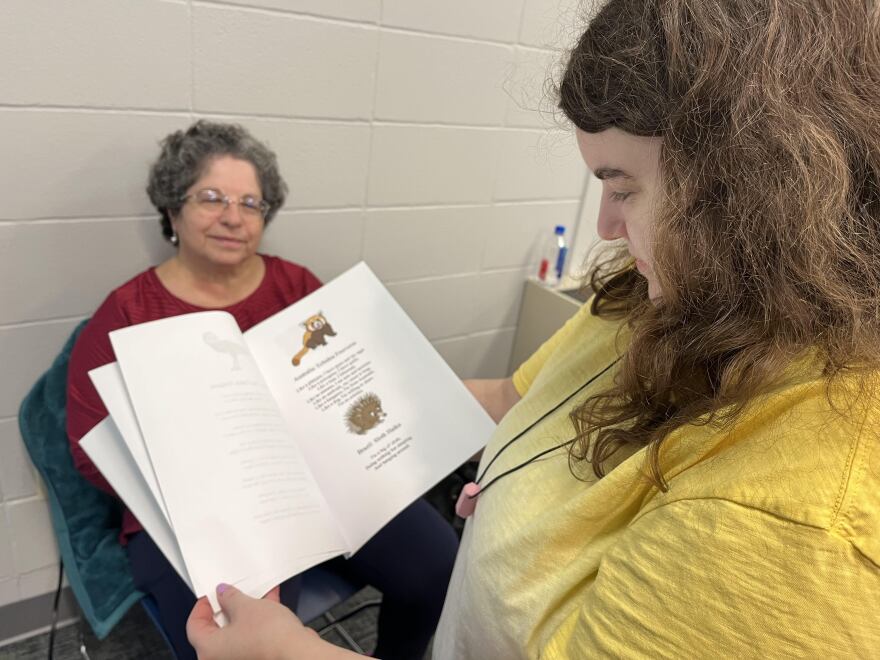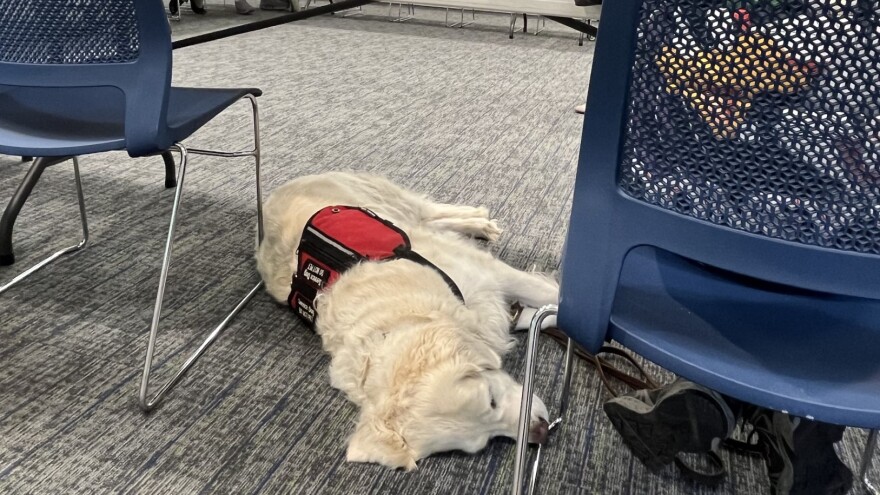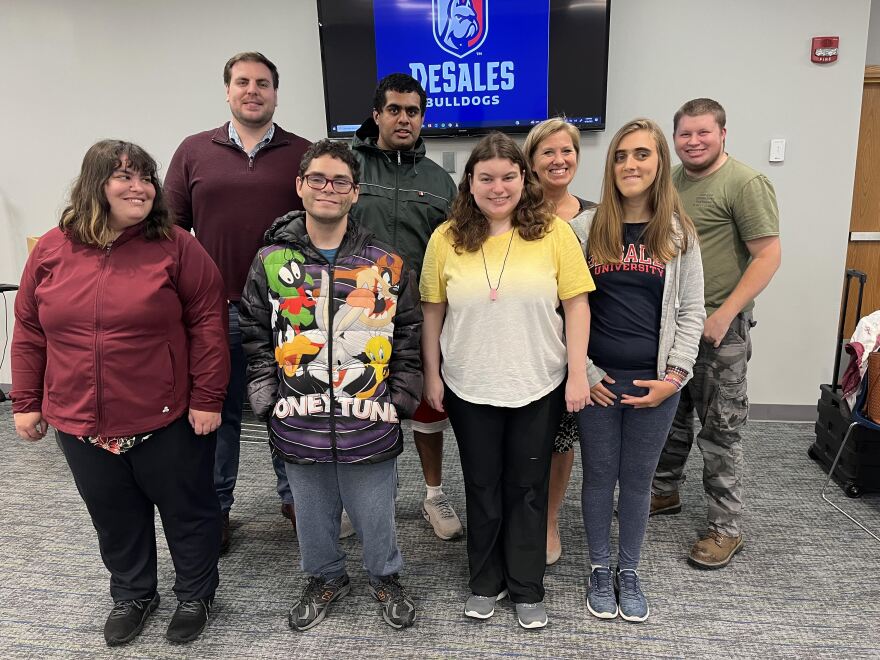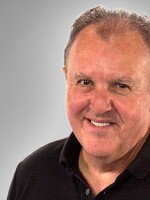- DeSales University assistant professor of business Elisabeth Felten is in her second year teaching a class of adults with special needs such as autism and Down syndrome
- Felten was inspired to create the class because of her daughter, Isabella, 22, who is autistic
- The class is open to all those with special needs who have a high school diploma
UPPER SAUCON TOWNSHIP, Pa. — They are college students.
Not in the traditional sense of dorm life, with full academic schedules, accredited courses, and weekend rager parties, but they are college students just the same.
Sixteen times throughout the DeSales University calendar year, three men and six women, ages 22 to 30, sit in a large room at the Dorothy Day Student Union for five hours and learn.
The topics include, but are not limited to, world cultures, poetry, lab science and foreign languages. They watch educational videos and participate in experiments. In creative writing, students are taught how to understand the motivation of main characters in movies and books, skills that then help them to write their own stories.
Members of the DeSales athletic teams visit the classroom to instruct them on their sport of choice. The students even play disc golf on the commons after lunch in the cafeteria.
They are engaged. They are eager.
They are college students.
After far too long, the heavy, locked door of college for those folks creaks invitingly open.
“Here, they’re thriving. They’re at college. That fuels me.”Elisabeth Felten, founder of post-secondary education class for special needs students, DeSales University
Each student brings energy, questions, knowledge, a unique personality and smiles.
What these non-traditional students also bring are a range of immense challenges: Varying degrees of autism and intellectual disabilities, Down syndrome and dyslexia.
They are young people in our community whose dreams of a college experience and other life joys have been dashed by the doubts, preconceived notions and rejection of others.
The roads these students traveled to arrive at college are cluttered with signs reading Stop, Wrong Way and No Outlet.
The most discouraging sign routinely stands grim at the college gate: Do Not Enter.
Enter Elisabeth Felten.
Fuel for the journey
Felten is an assistant professor in DeSales's Division of Business, where she teaches undergraduate and masters of business administration courses in accounting and finance.
While not formally trained as a special-needs instructor, she has been an educator since 1995 and formerly directed the Challenger Little League program for special needs children in Warminster, Bucks County.
First and foremost, however, Felten is mother to Isabella, 22, who was diagnosed with autism at age 2 ½ and whom she homeschooled for 10 years while running her own accounting firm.
If Felten can be described as the one who drove this college course for challenged adults to become reality, Isabella provided the fuel.
“The idea of this class started when Isabella was in middle school in the Quakertown Community School District,” Felten said recently in the Student Union prior to the start of a Tuesday morning class, as her daughter watched television nearby.
“We were in a transition meeting with the special education director who was pushing Isabella to attend a trade school. I told the director Isabella would like to go to college and that I support her. The director laughed at me.
“At that moment, I thought, 'My daughter is going to college if I have to start one myself.'”
And in September 2022, and with the blessing of DeSales, she kind of did.
Making invaluable connections
It is a Tuesday morning just after 10. Outside, the weather is gray, windy, and spitting light rain.
Inside Felten’s classroom, the sun is shining. Soothing. Enlightening.
Long folding tables are assembled to create a large square. With her assistant, J.P. Tiger, helping nearby, Felten stands inside the square and begins.
Canada was the homework assignment. Felten asks what anyone has learned about the country.
A female student responds, “It has provinces.” Felten acknowledges the correct answer with a nod and a smile. The student smiles in return.
The class is asked to identify the provinces in order, east to west. They collectively do. More smiles on both sides.
Felten roams the tables talking about French-speaking provinces. She instructs the students how to speak in French — to say hello, to pronounce their name, to express hunger, to cite their age.
Each student succeeds in parroting the lesson. Magnifique!
The class interacts. Felten deftly tapping the precise keys to delivering knowledge to each student’s individual needs while simultaneously melding them as one. The invaluable connection between teacher and student — and student to student — has been made.
“We are special needs aware,” Felten said. “We know what they need to keep their eyes open. We push them out of their comfort zone. My job as a teacher is to push their horizons.
“I see this as a one-room classroom, a one-room schoolhouse. But I have students of different levels. I have to understand each of their needs to teach them. I’ve built a program for those needs. This program is designed for lifelong education.”
Felten pauses and smiles.
“Our students give presentations, do research, and write poetry,” she said. “They’re having experiences they’ve never had before.
“Some students came from a school where they had a bad experience. We’re giving them a positive experience. The students like learning but not where they were, at that institution of learning. I explained to parents how our college and this program worked differently."
“Here, they’re thriving. They’re at college. That fuels me.”
It also fuels the parents of students.
Mimi Ludwig is president of the Autism Society Lehigh Valley. Her daughter, Stacy, 30, a second-year student, has an intellectual disability.
“Stacy is learning things here that she didn’t learn before,” Ludwig said. “She’s engaging with classmates on a college campus.”
Stacy has learned to use adapted technologies, such as using her voice to research her cell phone when doing writing activities.
Ludwig credited Felten with Stacy’s progress.
“This is because of Libby, who I’ve known for years back when she wanted to start a continuing education program here,” Ludwig said. “She said she wanted to do it to help students who want to experience college and the joy of life. I loved the idea.”
Added Stacy: “This class helps me learn things to know more about the future.”

Felten was teaching the class about Terry Fox, a native Canadian, who in 1981 after losing his right leg to cancer, attempted to run across the country on a prosthesis to raise cancer funding and awareness.
Sadly, Fox discontinued his run about 150 miles in due to leg pain. The cancer had returned and spread. He would eventually die from the disease.
But his spirit helped spawn Terry Fox Runs internationally that have raised more than $850 million to fight cancer.
“What I showed the students is that if anyone tells you that you can’t make a difference, that one person cannot make a difference, tell them about Terry Fox,” Felten said. “One person can make a big difference.
“The students have special needs, so we deliver the lesson differently. But the goals are the same — to learn.”
Almost never
All the students attend because they can.
But at least one almost never made it.
Luke Maeding is an engaging 22-year-old who is perpetually smiling. Smiles, however, were not always a reflective expression of the moment.

Luke’s birth mother aborted him at six months. Somehow, he survived.
However, he has endured multiple medical and emotional issues. He has undergone a double lung transplant and an intestinal transplant. He developed diabetes. Life embraced him wih cold hands.
Yet there Luke is, seated in class, wearing a black Looney Tunes hooded jacket, with service dog, Rey, napping at his feet.
A young man who almost never made it.
Learning.
At college.
Being just who they are
There are three requirements to join Felten’s class: An Individualized Education Plan certificate from high school, pay a nominal fee to cover course materials and insurance, and, perhaps most importantly, a desire to learn.
“A parent told me her daughter can be just who she is in my classroom,” Felten said. “That she just gets to be.
“I had another mother who told me her adult child walked across campus, ordered lunch, paid for it, and sat down with friends in the cafeteria. The student is 29 years old and her mother was so pleased about the progress.”
Felten has her own inspirational moment. She and Isabella were in the cafeteria one day. Isabella noticed another woman wearing the same DeSales sweatshirt and approached the woman to point that out.
“My daughter was exhibiting a normal college experience,” Felten said. “A normal experience. I saw that and had to hold back tears.”
An enriched life
The myth persists that all autistic people have an intellectual disability. The fact is that two-thirds of those on the spectrum have average or above-average IQs.
During one Tuesday class, Isabella Felten repeatedly answered questions correctly. She, her mother said, is the reason she stands in the center of those long tables and teaches, furiously pushing back against the doubters.
“Without Isabella, I wouldn’t have understood the needs of the students,” Felten said.
“And from this class, I want Isabella to have an enriched life, a full life. I want it to be enthralling. I want her to be involved. I definitely want her to keep growing.
“Her dreams are not different from anybody else. She just wants to be happy and fulfilled.”
Felten wishes the same for the rest of those college students in her class who are having a long-denied opportunity for knowledge.
“I love coming here with Mom to learn,” Isabella said.
One can almost hear that figurative Do Not Enter sign crashing to the ground.


